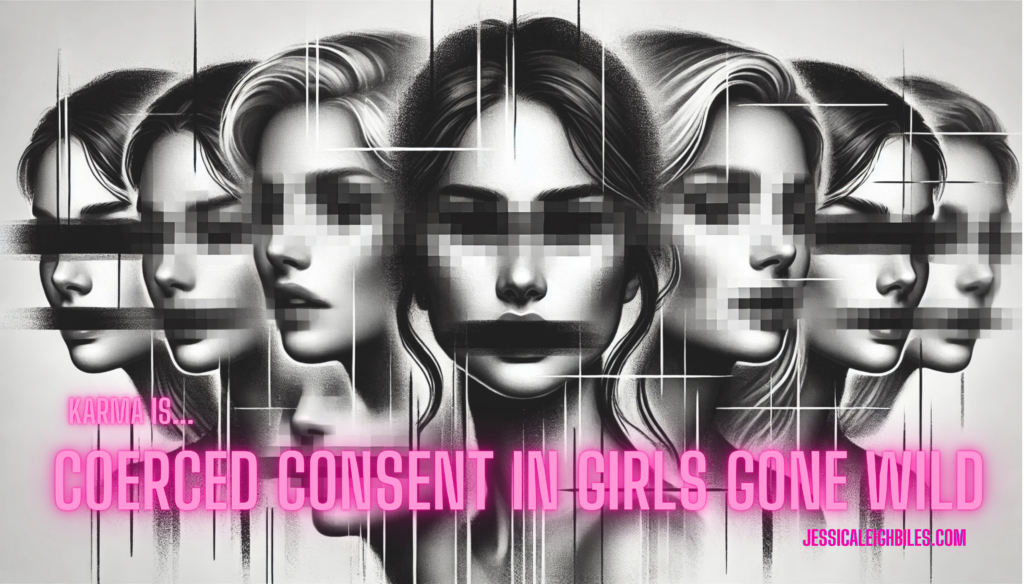The Girls Gone Wild empire built its fortune on manipulation, exploitation, and coerced consent. Growing up in its era, I didn’t fully understand the damage it caused—until now.
I grew up during the era of Girls Gone Wild and Spring Break. My conservative Christian home kept me shielded from most of it. We didn’t have MTV, and my parents forbade me from watching it. Still, as kids do, I found ways to see things I wasn’t supposed to. Even with limited exposure, those experiences left a lasting mark on me. Looking back now, I see how the culture surrounding Girls Gone Wild normalized exploitation, and the documentary opened my eyes to the prevalence of coerced consent in Girls Gone Wild.
The Era of Coerced Consent Girls Gone Wild
I never understood what Spring Break or Girls Gone Wild really meant. In college, people often talked about “going to Spring Break” as if it were a destination on a map. I had no real frame of reference. My thoughts on Girls Gone Wild felt just as abstract and disconnected from reality.
When I turned on the documentary, I expected to learn about a rich man exploiting women for profit. I did, but I also recognized so much of what I saw. The content felt hauntingly familiar. I had seen this before. I had seen him before. In some ways, the situations and the language used felt all too close to home.
Coerced Consent: A Disturbing Reality
The documentary forces an important conversation about consent. The experiences of the women it highlighted resonated deeply with me because I’ve faced similar manipulations in my own life. For example, during the trials, people shamed the women involved. They framed it as their fault, suggesting their clothing or attendance at certain events “invited” abuse.
Beyond that, the documentary highlighted how many of the women initially said no but were coaxed into saying a hesitant and shaky yes. The women did not give enthusiastic consent for these acts. Instead, they were manipulated, pushed, and pressured into doing things they hadn’t agreed to.
I know this story because I lived it. At 16, someone raped me. I convinced myself that I asked for it and deserved it. For 20 years, I gaslit myself into believing that lie while I clung to toxic and dangerous ideas about sex.
Joe Francis and a Culture of Coerced Consent in Girls Gone Wild
Leadership sets the tone for any organization. Knowing that, I expected Joe Francis, the founder of Girls Gone Wild, to be a terrible person. He still managed to shock me with the things he said. His words, from the height of his career to his most recent interviews, reveal the depths of his character.
I watched the interviews, hoping to see some form of accountability or growth. I wanted to believe he had reflected on his actions. I wanted to see redemption. But not everyone can be redeemed, and Francis falls squarely into that category.
In one deposition, he discussed consent in a way that horrified me. He claimed that if a girl didn’t give a hard “no,” it meant they could proceed. If she gave a firm “no,” they instructed the crew to back off. This so-called system wasn’t just flawed—it created the perfect storm for non-consensual sex.
The documentary raised significant issues, and Claire Hoffman’s article, “Baby Give Me a Kiss,” offers additional insight into the manipulation and coercion at the center of Joe Francis’s empire. In her Los Angeles Times article, Hoffman shares the story of a woman who accused Francis of raping her. The woman explained that she yelled “no” multiple times and tried to escape, but Francis ignored her protests. Hoffman’s article sheds light on Francis’s behavior beyond the women featured in the documentary, highlighting a disturbing pattern of manipulation and coercion that permeated his work and personal life.
The Importance of Accountability
Even now, Francis denies any wrongdoing. In fact, he once said that a man cannot rape his spouse. He even claimed that he was the real victim of rape in his marriage. Yet his ex-wife fled with their two daughters and later sued for custody. She accused him of rape, sexual harassment, physical abuse, and stalking.
Knowing people like Francis exist weighs heavily on me. It’s not just the existence of men like him but the absence of consequences for their actions. People like him inflict harm and never pay the price. Their refusal to atone for their behavior feels like an insult to the pain they caused.
Francis will never face redemption, nor will this story provide closure. Even the women he scarred forever will never get the justice they deserve. Honestly, I believe the world would be better without him—or anyone like him. In fact, if we could remove every person who caused harm and added nothing good to the world, we might find peace. These people took every opportunity to exploit, steal, molest, and destroy.
Grappling with the Balance of Good and Evil
What would the world look like without men like Francis? I like to imagine it would improve. Yet I can’t say for sure, and that uncertainty unsettles me.
While grappling with the existence of people like Francis, I’ve questioned whether their harm serves any purpose in the larger balance of the world. Without darkness, can we truly appreciate light? In life, we often hear that good and bad must coexist to create balance. While that idea may resonate in some contexts, it feels deeply flawed when considering the harm inflicted by people like Francis. The world needs both good and bad for perspective. However, the existence of coerced consent in Girls Gone Wild and its long-lasting impact raises larger questions about whether this balance is worth the harm it inflicts.
I hate the thought of that balance. It implies that some people exist only to do harm, no matter how many chances they have to choose otherwise. I want to believe something different. I want to believe people can make good, right choices when given the opportunity. Perhaps that’s true for most of us. But for some, it seems they will always choose the darkness.
Whether or not that balance exists, we must continue holding people like Francis accountable and supporting those they harm. This isn’t just a story about Joe Francis. It’s about the countless women harmed by coercion, and the cultural acceptance that allowed it to flourish.


